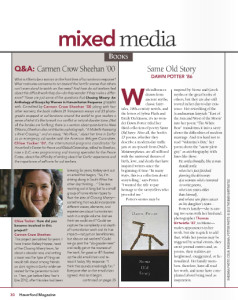Read more about Carmen Crow Sheehan’s contribution to Chasing Misery in this interview for Haverford’s Alumni Magazine. Click here!
Chloe Tucker: How did you become involved in this project?
Carmen Crow Sheehan:
This project percolated for years. I have known Kelsey Hoppe, head of the Chasing Misery team, for about a decade now, and writing a book was the type of thing we would talk about among friends on dark nights in Darfur while we waited for the generator to kick in. Then, just before New Year’s Eve 2012, after this idea had been Brewing for years, Kelsey sent out an email that began, “So, I’m driving along in South Africa the other day thinking…” She was reaching out at long last to a small group of humanitarian types to float the idea of Chasing Misery— something that would incorporate different voices, elements, and experiences about humanitarian work in a single volume. Did we think we could do it? Could we capture the complexity and depth of humanitarian work and its true impact—not just on beneficiaries, but also on aid workers? Could we go past the “do-gooder-ness” and really get at the rawness of the work, for good or ill? I looked up the old email chain and reread it today. My response: “I think this sounds smashingly fun.”
Everyone else on the email chain agreed. And so it began.
CT: When did you write “No Place,” your essay?
CCS:The piece was based on a hodgepodge of things I had written while in Darfur—emails, journal entries, that sort of thing—but I hadn’t gone back to compile or polish any of it until I decided to submit a piece of my own for Chasing Misery. This was the first time since being in Darfur that I’d re-read anything I had written there, and it was actually a very tough process. Those types of memories really stick to you, and even now as I think about it, I can feel my heart rate rising. I left Darfur in 2006, and seven years passed before I brought myself to re-visit those days with “No Place.” I’m glad I finally did.
CT: How do you define humanitarian work? For example, was the Darfuri midwife whom you photographed also performing humanitarian work?
CCS: If I had to boil it down, I’d say humanitarian work is the provision of assistance in crisis or emergency situations to save lives, alleviate suffering, and maintain human dignity. Was the midwife by the flooded river in Darfur performing humanitarian work too? Absolutely. She was the dean of a midwifery school and a very close colleague—we traveled together, worked together, ate together, brushed our teeth together, all those things one does on long trips to the field. … When I think of her, I, of course, think of everything she did to save lives, but perhaps more than that, I think of her dignity and Humanity. In a place where people did, and still do, such awful things—the rape, the killing, the destruction—that element of human dignity can be hard to keep hold of. She never lost it.And she carried it for others. I think that element of human dignity is a piece of humanitarian work that doesn’t get as much press, but that makes all the difference.The midwife in that photo didn’t just save lives. She made them feel valued as people in an otherwise hostile environment— that mattered a lot.
CT: I’ve found the term “help to helpers” cropping up with increasing frequency. How can “helpers” better prepare to engage in help in sustainable ways?
CCS: One recurring theme in my own observations is the importance of “self care,” recognizing that helping others can take a toll and trying to remember that we are much more effective in the long run if we take care of ourselves along the way. I suppose it’s like that speech they give on airplanes before takeoff: “Put on your own oxygen mask before helping others.” That can be very hard to do in the field of humanitarian aid, and I think it’s something most of us could get a lot better at. This is part of the reason the collective group of authors and photographers for Chasing Misery decided that 10 percent of all book royalties will go to the Headington Institute—to help them continue to provide care and support to aid workers when they need it most. If you go to the Headington Institute webpage, it states their vision in a bold, yellow box: “One day, all humanitarian workers will have the personal skills, social support, organizational resources, and public interest needed to maintain their wellbeing and thrive in their work.” I think a lot of us share that vision.[It’s] easier said than done, but clearly there are people out there who dare to dream.

